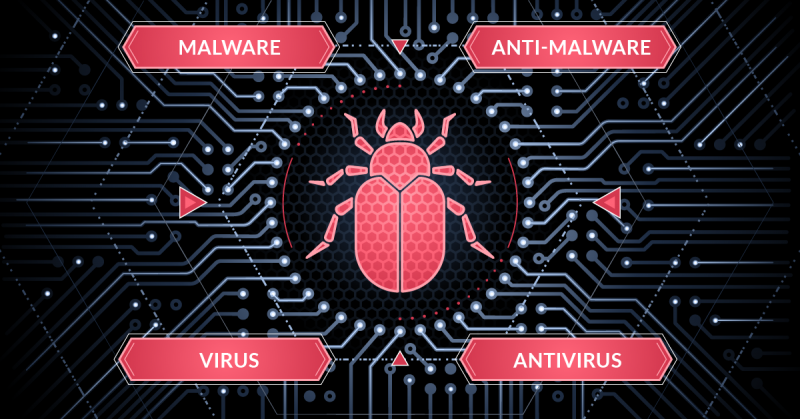Antivirus vs Anti malware: What’s the Difference?
Malware and viruses are a major threat to all computer users, especially on the Internet. The two terms are used interchangeably on a daily basis, but are they the same? In this article, we will give a brief overview of the difference between malware and viruses and then explain the difference between Antivirus and Anti-malware. Antivirus vs Anti malware
Antivirus vs. Antimalware
Simply put, malware is all software that performs unwanted tasks. A virus is a specific type of malware that replicates itself and infects other computer programs. The term “antivirus” comes from a time when most malware was viruses; malware comes in many forms today, and the term “anti-malware” refers to this broader perspective. Below, we explore this distinction in more detail.
Click here to download Free RAM Malware Tool
Antivirus Software Features
Antivirus software scans your computer or device and compares your files and software to a database for known viruses. A good antivirus program will offer a few key features:
- Real-time scanning to monitor your processes and files so new viruses are detected before they can spread
- Automatic updates to ensure known viruses are continually added to the database
- Virus removal and cleaning
Antimalware Software Features
Antimalware is a part of what Antivirus software does, but it also protects against evolving threats and focuses on finding new iterations of infected files and programs. A good anti-malware program has the following characteristics:
- An environment that allows software to be tested before it is allowed to work with the rest of the system, often referred to as sandboxing
- Filtering, which blocks access to and from suspicious websites and servers on the Internet
- Active security, with the ability to run scans, detect and remove known malware such as viruses, adware and spyware
What’s better: Anti-malware vs antivirus
As mentioned above, viruses were the real fear of the first decade of the World Wide Web. Technically, a virus is a malicious script that when executed replicates itself (like, you know, a real virus) and inserts its own code into your software, wreaking havoc. It could steal your personal information, prevent you from accessing essential data, and more. But in recent years the development of new viruses has been drastically reduced, and most of the ones that still exist are easy to manage if you use an up-to-date antivirus. Cybercrime, however, is more alive than ever – thanks to malware.
Anti-malware is the technically correct term for the solutions available today. Since there are so many types of malware out there, any cybersecurity company worth its salt would not release a solution that is just a traditional antivirus program. Today’s cybersecurity solutions must detect various forms of malware to keep up with the changing threat landscape. However, the term is still very interchangeable. So whether you are looking for anti-virus or anti-malware, you will generally be protected against viruses and malware, but to be safe, pay attention to the mention of zero-day exploits, polymorphic threats, adware, and spyware.
What to look for in cybersecurity
Ideally, to protect your company’s computer and server network, you should have a comprehensive protection solution that can both prevent threats and neutralize them when they occur. It doesn’t matter if a product claims to be antivirus or antimalware, you should look beyond the title and make sure the product protects against all types of malware. Many big cybersecurity brands do this, even in their most basic packages.
There are many free antivirus / antimalware programs that you can download, but they don’t offer the dense protection that paid solutions do such as RAM Ultimate Antivirus. Some antivirus programs simply protect you from viruses and leave you wide open to other malware. Spyware protection is good, but comprehensive protection against all malware is better.
You should also balance the protection with the available resources of your computer or network. Some anti-malware programs can slow down an older system. Most importantly, all employees need training in safe computing practices to protect their computer, data, and network. Even simple instructions on how to avoid phishing, check an email and its attachments, and report suspicious activity will go a long way in defending your important business data. Maintaining a robust cybersecurity infrastructure and training employees can prevent disasters that have cost countless businesses millions of dollars.
This article covers the answers to some of your frequently asked questions:
People May Also Like…
Data protection
What is the data protection Data protection has grown to be of utmost importance to both individuals and organizations in the connected. world of today, where information travels quickly across many digital
What is a security software
Security software It is impossible to overstate the value of strong security software in today's digital world. Individuals and organizations must take proactive measures to safeguard their sensitive data and defend against
Website reputation analysis
Website reputation analysis Websites are incredibly important for establishing an online presence for businesses, organizations, and people in the modern world. Analysis and evaluation of a website's reputation are crucial because there are
What is a Virtual private network (VPN)
What is a virtual private network (VPN) Virtual private network (VPN) have become an essential tool for both individuals and businesses in a time when online privacy and security are of the








